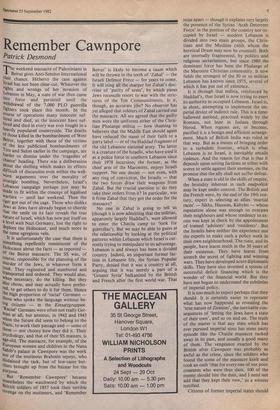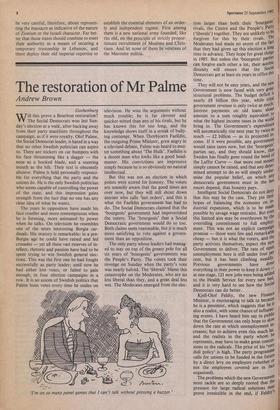Remember Cawnpore
Patrick Desmond
The weekend massacre of Palestinians in Beirut gives Anti-Semites International their chance. Hitherto the case against Israel has not been clear-cut. Whatever the rights and wrongs of her invasion of Lebanon in May, a state of war then came into force and persisted until the Withdrawal of the 7,000 PLO guerrilla righters took place this month. In the course of operations many innocent suf- fered and died, as the innocent have suf- fered and died in every war ever fought in a heavily populated countryside. The deaths of those killed in the bombardment of West Beirut, together with those of the victims of the less publicised bombardments of TYre and Sidon earlier in the campaign, are harder to dismiss under the 'tragedies of chance' heading. There was a deliberation about the shelling which makes its effects difficult of discussion even within the well- worn arguments over the morality of strategic bombing. Nevertheless, Israel's Lebanon campaign perhaps just may be Made to fit within the concept of legalised warfare — until last weekend. Then the tiger got out of the cage. Those who dislike Jews as Jews have already begun to chortle that the smile on its face reveals the true nature of Israel, which has now put itself on a level with Nazi Germany, lost the right to deplore the Holocaust, and much more in the same egregious vein. It is unfortunately the case that there is something repellently reminiscent of the Holocaust about the facts — as reported of the Beirut massacre. The SS was, of Course, responsible for the planning of the murder of the Jews, in whatever form it took. They registered and numbered and transported and ordered. They would also, When necessary, do the killing. But they also chose, and may actually have prefer- red, to get others to do it for them. Hence the high proportion of 'racial' Germans those who spoke the language without be- ing citizens — in the Einsatzgruppen.
, Racial' Germans were often not really Ger- man at all, but anxious, in 1942 and 1943 when the future did seem to belong to the Nazis, to work their passage and — some of
them not choosy how they did it. Their PsYchology, and that of their SS masters, is age-old. The massacre, for example, of the European women and children in the Nana Sahib's palace at Cawnpore was the work not of the mutinous Brahmin sepoys, who disdained the task, but of low-caste but- chers brought up from the bazaar for the Purpose.
But 'Remember Cawnpore' became nonetheless the watchword by which the British soldiers of 1857 took their terrible revenge on the mutineers, and 'Remember
Beirut' is likely to become a taunt which will be thrown in the teeth of `Zahal' — the Israeli Defence Force — for years to come. It will sting all the sharper for Zahal's doc- trine of 'purity of arms', by which pious Jews reconcile resort to war with the stric- tures of the Ten Commandments. Is it, though, an accurate jibe? No observer has yet alleged that soldiers of Zahal carried out the massacre. All are agreed that the guilty men wore the uniforms either of the Chris- tian Phalange militia — how shaming to believers that the Middle East should again have reduced the name of their faith to a party label — or of the Haddad fragment of the old Lebanese national army. The latter is a creature of the Israelis, who have used it as a police force in southern Lebanon since their 1978 incursion; the former, as the chief arm of the Maronites, enjoys Israeli support. No one denies — not even, with any ring of conviction, the Israelis — that the two forces draw their weapons from Zahal. But the crucial question is: do they take their orders from it? In particular, was it from Zahal that they got the order for the massacre?
No one in Zahal is going to tell us (though it is now admitting that the militias, apparently largely Haddad's, were allowed to enter the Chatila camp to 'look for guerrillas'). But we may be able to guess at the relationship by looking at the political patterns within Lebanon which Israel is cur- rently trying to manipulate to its advantage. Lebanon is and always has been a divided country. Indeed, an important former fac- tion in Lebanese life, the Syrian Popular Party, denied that it was a country at all, arguing that it was merely a part of a `Greater Syria' balkanised by the British and French after the first world war. That issue apart — though it explains very largely the presence of the Syrian 'Arab Deterrent Force' in the portion of the country not oc- cupied by Israel — modern Lebanon is divided into two main groups, the Chris- tians and the Muslims (with whom the heretical Druze may now be counted). Both are internally fragmented, by politics and religious sectarianism, but since 1980 the dominant force has been the Phalange of the Maronite Christian community. It now fields the strongest of the 30 or so militias Lebanon has known since 1975, several of which it has put out of existence.
It is through that militia, reinforced by Haddad's, that Israel is now trying to exert its authority in occupied Lebanon. Israel is, in short, attempting to implement the im- perial device of indirect rule. This is a time- hallowed method, practised widely by the Romans, not least in Judaea through Herod. When regions are, or become, pacified it is a benign and efficient arrange- ment. Much of British India was ruled in that way. But as a means of bringing order to a turbulent frontier, which is what Lebanon is to Israel, it inevitably entails violence. And the reason for that is that it depends upon setting factions or tribes with scores to settle against their enemies, on the promise that the ally shall not suffer defeat.
When a state is old in the skills of empire, the brutality inherent in such realpolitik may be kept under control. The British and the French were, by the end of the 19th cen- tury, expert in selecting as allies `martial races' — Sikhs, Haussas, Kabyles — whose reputation alone was enough to overawe their neighbours and whose tendency to ex- cess was kept in check by the appointment of trained 'advisors' and 'residents'. But the Israelis have neither the experience nor the experts to make such a policy work in their own neighbourhood. The state, and its people, have learnt much in the 30 years of their existence. They have learnt from scratch the secret of fighting and winning wars. They have developed acute diplomatic skills. They have also invented a system of successful deficit financing which is the wonder of the financial world. But they have not begun to understand the subtleties of imperial policy.
It is too much to expect perhaps that they should. It is certainly easier to represent what has now happened as revealing the `true nature of Zionism', the inevitable con- sequences of `letting the Jews have a state of their own', and so on and on. The truth of the matter is that any state which has ever pursued imperial aims has some nasty episode like the Chatila massacre tucked away in its past, and usually a good many of them. The vengeance exacted by the British after Cawnpore was probably as awful as the crime, since the soldiers who found the scene of the massacre knelt and took an oath 'that for every one of our poor creatures who were thus slain, 100 of the enemy should bite the dust, and I need not add that they kept their vow,' as a witness testified.
Citizens of former imperial states should be very careful, therefore, about represen- ting the massacre as indicative of the nature of Zionism or the Israeli character. Far bet- ter that those states should combine to exert their authority as a means of securing a temporary trusteeship in Lebanon, and there deploy their old imperial expertise to establish the essential elements of an order- ly and independent regime. First among them is a new national army founded, like the old, on the principle of strictly propor- tionate recruitment of Muslims and Chris- tians. And let none of them be veterans of the Maronite militia.



































 Previous page
Previous page